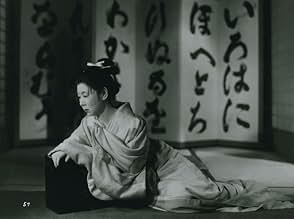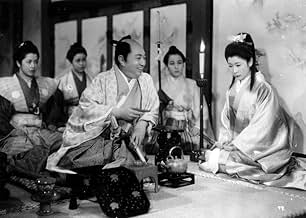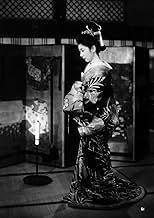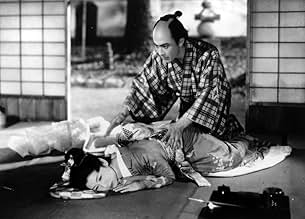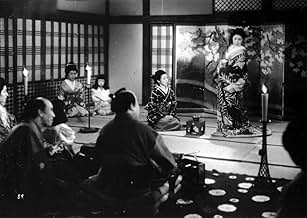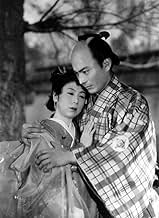IMDb-BEWERTUNG
8,1/10
8079
IHRE BEWERTUNG
Folgt dem Kampf und dem Überleben einer Frau inmitten der Wechselfälle des Lebens und der Grausamkeit der Gesellschaft.Folgt dem Kampf und dem Überleben einer Frau inmitten der Wechselfälle des Lebens und der Grausamkeit der Gesellschaft.Folgt dem Kampf und dem Überleben einer Frau inmitten der Wechselfälle des Lebens und der Grausamkeit der Gesellschaft.
- Regie
- Drehbuch
- Hauptbesetzung
- Auszeichnungen
- 2 Gewinne & 1 Nominierung insgesamt
Akira Oizumi
- Manager Bunkichi
- (as Hiroshi Oizumi)
Empfohlene Bewertungen
As this film opens, Oharu (Kinuyo Tanaka), a 50 year old prostitute, goes into a Buddhist temple and looks back at her life. We see that she was once loved, but because her young suitor (the great Toshiro Mifune) was of a lower caste, it was forbidden, resulting in her being banished and him being beheaded. As her family has been shamed, her father jumps on the chance to send her to a local Lord who is looking for a mistress who can be a surrogate mother. Unfortunately, she's abruptly dismissed after bearing him a son, and from there she steadily declines. The film was highly personal to director Kenji Mizoguchi since his own sister (who had raised him) was sold by their father to be a geisha, which is one of the things that happens to Oharu.
Like 'Ugetsu', the film Mizoguchi made the following year, 'The Life of Oharu' is a morality tale, and while it's less heavy-handed than 'Ugetsu', it is fairly melodramatic. The central message is one of Buddhist compassion, and not just for those who we know have had a sad, unfair life – but also those who appear derelict or decrepit to us, and who we might otherwise judge, not knowing what they've experienced. While there is depth to that message, and it's certainly nice seeing a film that empathizes with woman and the misogyny they endure, 'The Life of Oharu' is dark and hard to watch for 148 minutes. The plot is quite linear and we see her used and abused in every single societal role she plays: daughter, lover, concubine, courtesan, wife, nun, and common prostitute. I also don't think Tanaka was well utilized in this role – she simply doesn't look young enough in early scenes, or old enough in later scenes. The filmmaking is good and the film has a solid place in film history for its message, but it's too bleak, and too simplistically so, for a film of this length.
Like 'Ugetsu', the film Mizoguchi made the following year, 'The Life of Oharu' is a morality tale, and while it's less heavy-handed than 'Ugetsu', it is fairly melodramatic. The central message is one of Buddhist compassion, and not just for those who we know have had a sad, unfair life – but also those who appear derelict or decrepit to us, and who we might otherwise judge, not knowing what they've experienced. While there is depth to that message, and it's certainly nice seeing a film that empathizes with woman and the misogyny they endure, 'The Life of Oharu' is dark and hard to watch for 148 minutes. The plot is quite linear and we see her used and abused in every single societal role she plays: daughter, lover, concubine, courtesan, wife, nun, and common prostitute. I also don't think Tanaka was well utilized in this role – she simply doesn't look young enough in early scenes, or old enough in later scenes. The filmmaking is good and the film has a solid place in film history for its message, but it's too bleak, and too simplistically so, for a film of this length.
Mizoguchi's empathy for female characters is legendary. The Life of Oharu is one outstanding example. One woman's journey from member of the imperial court to elderly streetwalker is narrated in exquisite, shimmering, painful style. Oharu (Kinuyo Tanaka) is seduced by a man below her station. Her crime is to love the man back unreservedly. That action becomes the catalyst for a series of degradations punctuated by false dawns, as Oharu's life spirals to rock bottom. And as bleak and depressing as that sounds, Mizoguchi's storytelling, combined with Tanaka's dignified portrayal, make this film cathartic, a tragedy with a small, life-affirming message at its heart. It is a cautionary tale to the follies of social mores, and the burden that women through the ages have to endure. More than that, it is a tale of one woman's dignity through the most humiliating of circumstances. Stunning.
Deeply tragic and sad tale that is nevertheless presented to us with great dignity and style. A tale of the harshness of feudal Japan and the way the men treat the women is unfortunately not without its echo, even today in that great country. A woman here, originally of noble beginnings, makes bad, then good, then more and more bad and none of it of her making. She is simply the result in men's dealings and hypocrisies. Still beautiful to look at though with the magical camera-work and immaculate direction. Some slight confusions at first until we realise that time jumps at the blink of an eye and before we know it one period has slid effortlessly into another, where inevitably another tragedy awaits our fallen heroine.
Kenji Mizoguchi's stunning masterpiece is a heartbreaking tale of purity in a world of corruption. Based on a seventeenth-century novel by Saikaku Ihara called The Woman Who Loved Love, the film tells the story of Oharu, a young woman who in her younger days worked as a lady-in-waiting at the Imperial Palace of Kyoto, but having fallen in love with a man below her rank is expelled from the palace, and she and her parents are forced to live in exile. Try as she might to find love in her relationships, she is constantly thwarted by her society's low expectations for a woman's heart and her father's ambitions for respectability, and soon descends to being a concubine, later a streetwalking prostitute. Mizoguchi's tones are so gentle and poetic that every frame works its way into your heart, and in such a delicate manner. Kinuyo Tanaka's performance as Oharu is beautiful as well, abandoning the melodramatic gestures common to Japanese film acting and going straight for the heart. Sumptuous production design and a decidedly feminist message make a film well worth seeing.
I finally saw Life of Oharu at the Ontario Cinematheque in Toronto last night and what an amazing film it was.
I don't know why I held out on Mizoguchi for so long. I think it's because I watched a lot of Ozu in the day and expected more of the same heavily restrained, obliquely symbolic style which is often as alienating as it is inventive. I couldn't have been further off the mark. Mizoguchi's style is fluid and assured like Hitchcock and Bresson. He also injects a warmth of spirit and shows a genuine interest in storytelling which is often absent in much of Ozu's ouevre.
The Story of Oharu is a treatise on how women are economically exploited in a patriarchal society. This is probably one of the greatest 'women's films' ever made. It ranks above 'Breaking The Waves' and Sirk's 'Imitation of Life'. No small feat!! If you like stories that actually say something about the world in which we live, I would strongly recommend this film. It's a masterpiece of world cinema. I am definitely going to see more Mizoguchi.
I don't know why I held out on Mizoguchi for so long. I think it's because I watched a lot of Ozu in the day and expected more of the same heavily restrained, obliquely symbolic style which is often as alienating as it is inventive. I couldn't have been further off the mark. Mizoguchi's style is fluid and assured like Hitchcock and Bresson. He also injects a warmth of spirit and shows a genuine interest in storytelling which is often absent in much of Ozu's ouevre.
The Story of Oharu is a treatise on how women are economically exploited in a patriarchal society. This is probably one of the greatest 'women's films' ever made. It ranks above 'Breaking The Waves' and Sirk's 'Imitation of Life'. No small feat!! If you like stories that actually say something about the world in which we live, I would strongly recommend this film. It's a masterpiece of world cinema. I am definitely going to see more Mizoguchi.
Wusstest du schon
- WissenswertesThis film, which was director Kenji Mizoguchi's dream project, was severely under-financed, and the production was forced to use a warehouse instead of a regular sound stage. This warehouse happened to be located near railways, and each time a train passed by, they had to stop shooting, which made the shooting of the film even more difficult with the director's obsessive use of long, continuous, uninterrupted takes. The same warehouse was also used for Josef Von Sternberg's film 'The Saga of Anatahan'.
- Zitate
Katsunosuke: Lady Oharu, a human being - no, woman - can only be happy if she marries for love. Rank and money don't mean happiness.
- Crazy CreditsOpening credits shown over Japanese artwork/water-colors.
- VerbindungenFeatured in Die geheimnisvolle Sekte (1978)
Top-Auswahl
Melde dich zum Bewerten an und greife auf die Watchlist für personalisierte Empfehlungen zu.
- How long is The Life of Oharu?Powered by Alexa
Details
Box Office
- Weltweiter Bruttoertrag
- 6.921 $
- Laufzeit
- 2 Std. 28 Min.(148 min)
- Farbe
- Sound-Mix
- Seitenverhältnis
- 1.37 : 1
Zu dieser Seite beitragen
Bearbeitung vorschlagen oder fehlenden Inhalt hinzufügen

